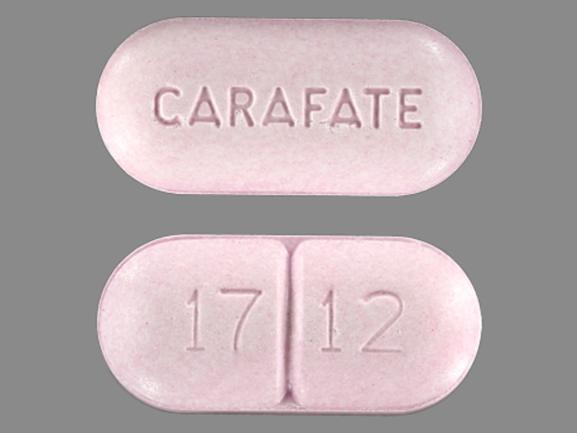Carafate Side Effects
Generic name: sucralfate
Medically reviewed by Drugs.com. Last updated on Feb 18, 2024.
Note: This document provides detailed information about Carafate Side Effects associated with sucralfate. Some dosage forms listed on this page may not apply specifically to the brand name Carafate.
Applies to sucralfate: oral suspension, oral tablet.
Precautions
It is very important that your doctor check your progress at regular visits to make sure that this medicine is working properly and to check for unwanted effects.
This medicine may affect your blood sugar levels. Check with your doctor right away if you have increased thirst or increased urination. If you notice a change in the results of your urine or blood sugar tests, or if you have any questions, check with your doctor.
Do not take other medicines unless they have been discussed with your doctor. This includes prescription or nonprescription (over-the-counter [OTC]) medicines and herbal or vitamin supplements.
Common side effects of Carafate
Some side effects of sucralfate may occur that usually do not need medical attention. These side effects may go away during treatment as your body adjusts to the medicine. Also, your health care professional may be able to tell you about ways to prevent or reduce some of these side effects.
Check with your health care professional if any of the following side effects continue or are bothersome or if you have any questions about them:
Less common side effects
Rare side effects
Serious side effects of Carafate
Along with its needed effects, sucralfate (the active ingredient contained in Carafate) may cause some unwanted effects. Although not all of these side effects may occur, if they do occur they may need medical attention.
Check with your doctor immediately if any of the following side effects occur while taking sucralfate:
Incidence not known
- blue lips and fingernails
- blurred vision
- chest pain
- cough
- coughing that sometimes produces a pink frothy sputum
- difficult, fast, noisy breathing
- difficulty in swallowing
- dry mouth
- feeling of fullness
- flushed, dry skin
- fruit-like breath odor
- hoarseness
- increased hunger
- increased sweating
- increased thirst
- increased urination
- loss of appetite
- nausea
- pale skin
- slow or irregular breathing
- stomach pain
- sweating
- swelling of the face, mouth, lips, or throat
- swelling of the legs and ankles
- tightness in the chest
- troubled breathing
- unexplained weight loss
- unusual tiredness or weakness
- vomiting
See also:
For healthcare professionals
Applies to sucralfate: compounding powder, oral suspension, oral tablet.
General adverse events
The most commonly reported side effect was constipation.[Ref]
Gastrointestinal
- Common (1% to 10%): Constipation
- Uncommon (0.1% to 1%): Dry mouth, nausea
- Rare (0.01% to 0.1%): Bezoar formation
- Frequency not reported: Diarrhea, flatulence, gastric discomfort, indigestion, vomiting
- Postmarketing reports: Lip swelling, mouth edema[Ref]
Bezoars were reported in patients with enteral feedings, delayed gastric emptying, and/or low birthweight neonates.[Ref]
Nervous system
- Common (1% to 10%): Headache
- Frequency not reported: Dizziness, drowsiness/sleepiness, encephalopathy, vertigo
- Postmarketing reports: Cerebral emboli[Ref]
Encephalopathy occurred in patients with chronic renal impairment and/or on long-term treatment.
Cerebral emboli occurred in patients receiving IV administration.[Ref]
Dermatologic
- Uncommon (0.1% to 1%): Urticaria
- Rare (0.01% to 0.1%): Rash
- Frequency not reported: Pruritus
- Postmarketing reports: Face edema[Ref]
Musculoskeletal
Osteodystrophy and osteomalacia occurred in patients with chronic renal impairment and/or on long-term treatment.[Ref]
Hypersensitivity
- Frequency not reported: Anaphylactic reaction, hypersensitivity reactions[Ref]
Respiratory
- Frequency not reported: Dyspnea
- Postmarketing reports: Bronchospasm, laryngeal edema, pharyngeal edema, pulmonary emboli, respiratory tract edema[Ref]
Pulmonary edema occurred after IV administration.[Ref]
Other
- Frequency not reported: Thirst
- Postmarketing reports: Face edema[Ref]
Hematologic
- Frequency not reported: Anemia[Ref]
Anemia occurred in patients with chronic renal impairment and/or on long-term treatment.[Ref]
Psychiatric
Metabolic
- Frequency not reported: Hyperglycemia[Ref]
Cardiovascular
- Frequency not reported: Edema[Ref]
References
1. (2001) "Product Information. Carafate (sucralfate)." Hoechst Marion Roussel
2. Cerner Multum, Inc. "UK Summary of Product Characteristics."
3. Cerner Multum, Inc. "Australian Product Information."
Frequently asked questions
More about Carafate (sucralfate)
- Check interactions
- Compare alternatives
- Pricing & coupons
- Reviews (72)
- Drug images
- Dosage information
- During pregnancy
- Generic availability
- Support group
- Drug class: miscellaneous GI agents
- Breastfeeding
- En español
Patient resources
Professional resources
Related treatment guides
Further information
Carafate side effects can vary depending on the individual. Always consult your healthcare provider to ensure the information displayed on this page applies to your personal circumstances.
Note: Medication side effects may be underreported. If you are experiencing side effects that are not listed, submit a report to the FDA by following this guide.

